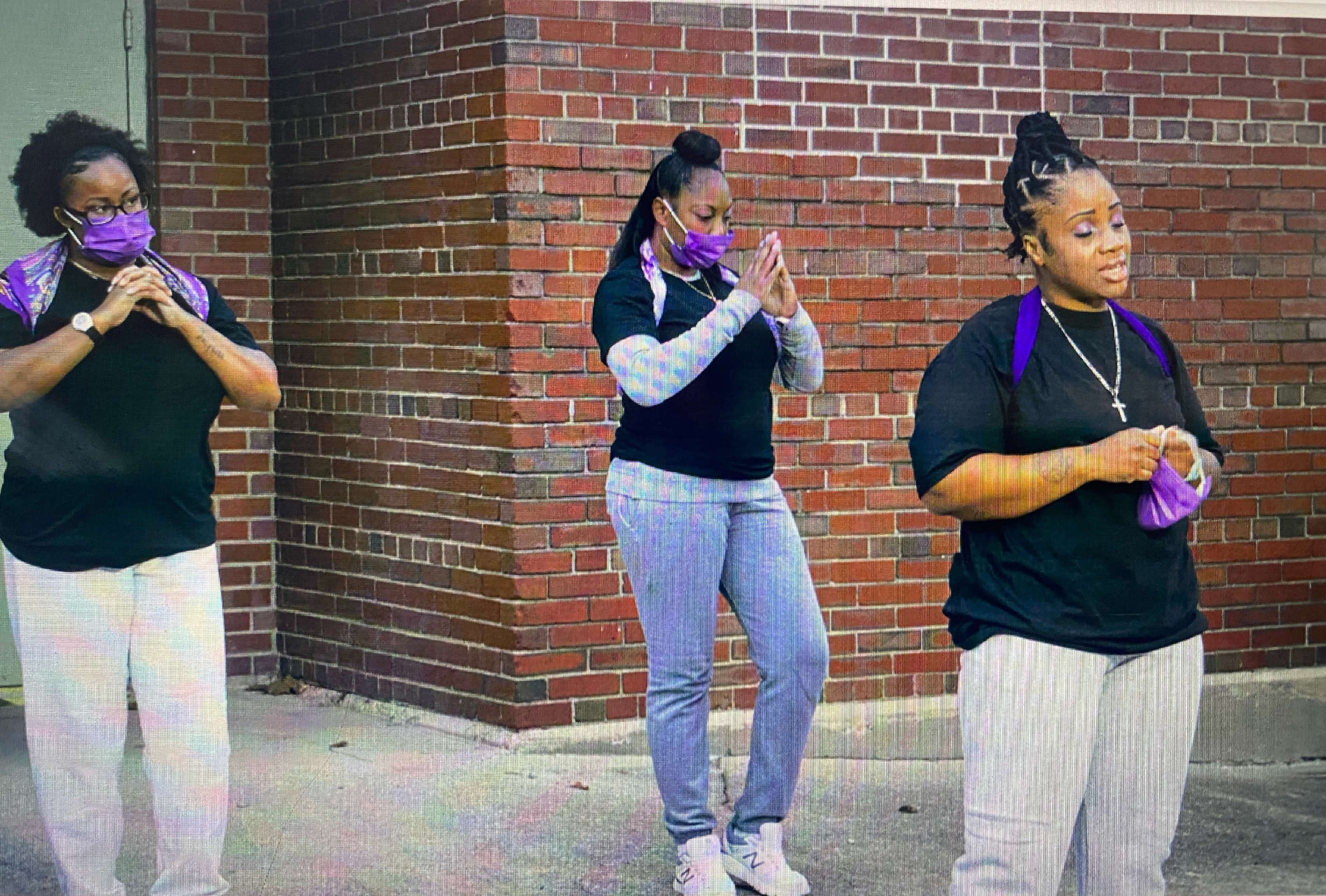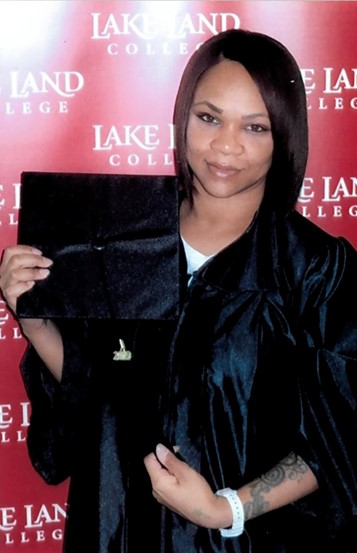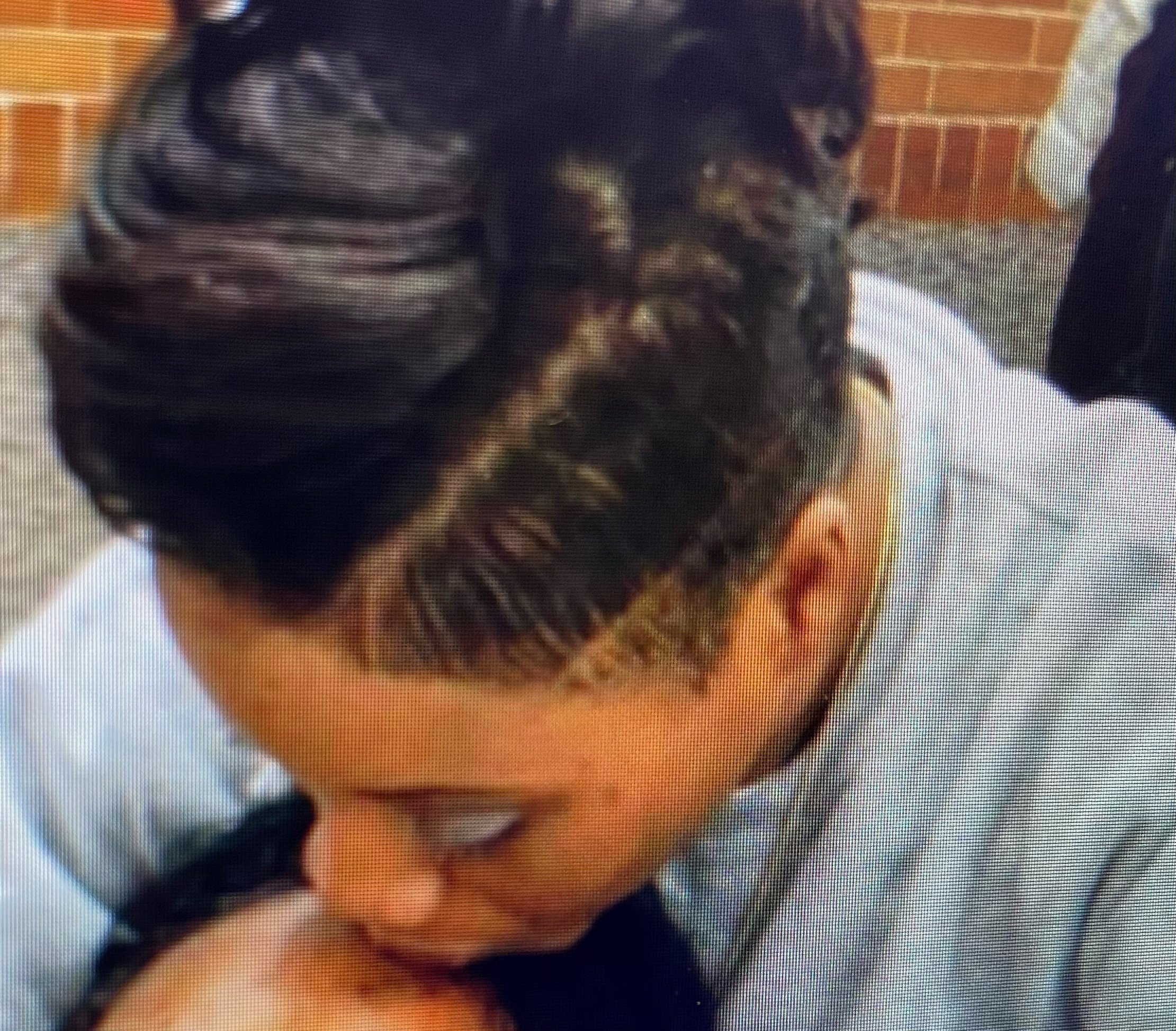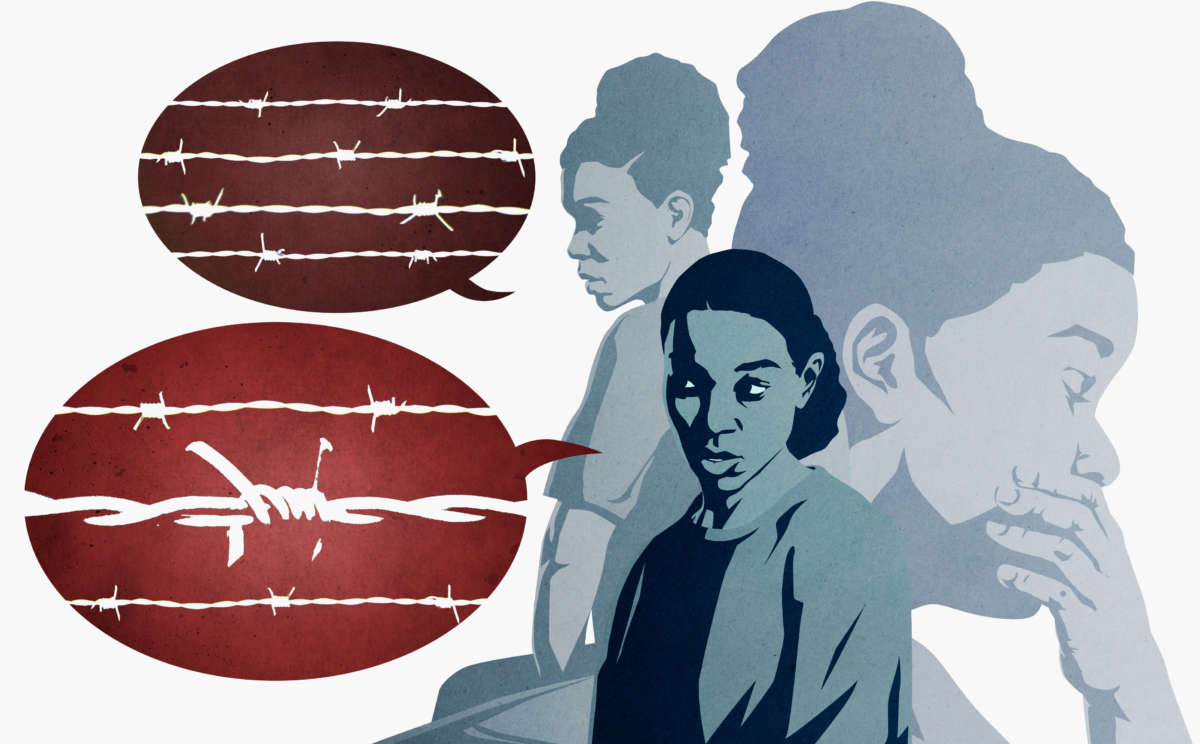On December 15, 2021, 10 days before Christmas, DeBraca Harris sat in a Chicago, Illinois, courtroom to learn whether the legal system would recognize the sexual violence she had endured and allow her to reunite with her family before 2036.
In 2005, Harris was a 26-year-old Black mother with four children under the age of 7. She was also pregnant with her fifth.
Her boyfriend, Willie Collins, was extremely abusive. His violence included beatings, strangulations, dragging her by her hair and threatening her with guns. He assaulted her in front of others, including her family members and his own mother. His violence increased when rent or bills were due. “These were the times that I was the most frightened about what he might do,” Harris described in a later affidavit.
Harris had attempted to leave Collins, moving to Atlanta, Georgia, to start a new life while pregnant. But Collins made Harris feel guilty about separating him from his newborn, and she agreed to return to Chicago. The violence continued.
In 2005, the family moved to a house owned by a man named Tracy Jones. Harris paid the first month’s rent. When she could not pay the second month, Jones told her he would not evict them if she had sex with him. “I did not want to do this, but at the same time, I wanted to put a roof over my kids’ head[s],” Harris stated in her affidavit. “I was also scared about what Willie might do if we were evicted because he was always the most violent with me when we couldn’t pay rent or bills. So I agreed.”
“The sex was rough, painful and humiliating,” Harris recalled in her affidavit. “I frequently bled and would be swollen afterwards. This happened multiple times throughout my pregnancy. Sometimes, I would cry or beg Mr. Jones to stop being so rough, but he did not seem to care.”
When she tried to stop their arrangement, Jones threatened to tell Collins that she was having an affair. Terrified, she continued.
After giving birth, Harris refused to continue. Jones began eviction proceedings. In June 2006, Harris was packing the family’s belongings when Jones arrived. Collins had taken the other children to his mother’s house, leaving only their 7-month-old son. Jones told Harris that he would stop the eviction if she went with him. “I definitely was not going to have sex with him,” Harris later stated. “But I thought maybe I could talk him into not evicting us.”
They drove their separate cars to an alley several blocks away. There, Jones called Harris into his car. She unstrapped her infant from her car and brought him. He demanded that she have sex with him. When she refused, he attempted to force her. Harris pulled away, grabbed her son and left his car.
Jones called her over again and Harris went, hoping to plead for a few extra days before eviction. This time, she brought her son’s diaper bag, which held Collins’s gun, for protection. When she refused to get into his car, he grabbed her by the shirt and punched her. Harris shot and killed him.

Harris was arrested later that day. After speaking with police, she collapsed on the floor of the precinct and was revived by paramedics. She was transferred to the Cook County Jail, where she remained for nearly six years. She attempted suicide twice — once soon after her arrest and again in 2010. Her children, ranging in age from 7 weeks to 8 years old, were separated. The three youngest were raised by Collins’s mother; the oldest moved to Indiana with his paternal grandparents, and the second-oldest to Atlanta with Harris’s mother.
She was charged with first-degree murder with a firearm enhancement. If convicted, she faced a minimum sentence of 45 years.
“I felt alone, judged, lost and scared as hell,” Harris told Truthout. “When my public defender came to see me, as hesitant as I was of this man, I told him my story. All the gruesome details of what I had endured and how emotionally imbalanced I was, and nothing came of it. What did he do with all the notes he was taking? Did he care? Did he believe me?”
Harris never found out. In 2012, her attorney told her that the prosecutor had agreed to a plea deal of 30 years, striking the firearm enhancement. Harris recalls being told that, if she rejected the offer, she faced 60 years.
“I asked to speak with my family and [was] told no,” she recalled. “So I pled out to the deal. My story wasn’t heard. It didn’t matter what I had gone through or endured. The only conclusion they drew from my situation was a Black girl, with all these babies, killing her landlord ‘cause she couldn’t pay her rent.”
Harris was sentenced to 30 years in prison.

“They Disregarded Everything”
Women’s prisons across the country are filled with survivors of sexual and domestic violence. A survey at Logan Correctional Center, Illinois’s largest women’s prison, found that 99 percent had experienced physical, emotional or sexual abuse during their lives. The entanglement of gender-based violence and incarceration is not limited to Illinois. Across the United States, 86 percent of women in jails reported experiencing sexual violence and 77 percent also reported experiencing partner violence.
Women of color experience higher rates of domestic and sexual violence than their white counterparts. Approximately 4 of every 10 Black women have experienced intimate partner violence. Black women are more than twice as likely to be killed by their partner than white women. A 2008 study of housing-related sexual harassment complaints found that 58 percent of victims were Black women or women of color.
At the same time, Black women are disproportionately criminalized and incarcerated. They are imprisoned at nearly twice the rate of white women. In many cases, police, prosecutors, juries and judges disbelieve or dismiss their experiences of abuse.
“The legal system continues to not see survivors, particularly survivors of color, as victims, as worthy of protection, as believable, when they talk about what they’ve survived,” said Rachel White-Domain, director of the Women and Survivors Project at the Illinois Prison Project, which focuses on post-conviction cases affected by an underlying history of gender violence, including Harris’s.
Most women experience sexual and street harassment on a near-daily basis — from men asking them to smile, engaging in unwanted conversation or propositioning them. “Our immediate reaction is to accommodate, to smile, to do something to make sure that male person doesn’t get angry with you because if he gets angry, it might be really dangerous,” said White-Domain.

That proved true for Antheshia Lee, now serving a 29-year prison sentence in Illinois.
In 2000, Lee was an 18-year-old Black mother living in Dekalb, Illinois, with her 2-year-old daughter, Armoni, her new boyfriend, Vernon Washington, and a roommate.
Later that year, Washington was arrested for selling drugs. Because Lee was having car troubles, their roommate arranged for another friend, Antonio Cureton, to give her a ride to the jail. During the drive, Cureton asked Lee if she had ever cheated on Washington during his incarceration.
“He told me that he bet he could change that,” Lee recounted in her first clemency petition. “I told him I doubted that he could. He then told me that I should feel privileged that he was talking to me because he considered himself to be a king. When I expressed my distaste at his comment he threatened to kick me out of his car and make me walk. I rode the rest of the way in silence.”
His parting words were, “Learn some manners.”
This was the start of Cureton’s harassment, which soon escalated into intimidation, threats of sexual violence and actual physical violence. Several weeks later, Lee’s roommate brought Cureton home. Cureton apologized for his previous behavior but, several minutes later, after staring at Lee’s crotch, commented on her genitals. He ignored Lee’s order to leave, bragging that he had knocked out a female police officer and would not hesitate to do the same to her.
She ran into him several times after that. Each time, Cureton verbally harassed her. Cureton, who also sold drugs, began taking over Washington’s territory, a takeover which became a point of contention between the two men upon Washington’s release in December 2000.
Lee’s grandmother, Annie Lee, later recounted that every time they spoke, Lee expressed her fears of Cureton.
While visiting Annie in Chicago, Lee learned that Cureton’s brother and friends had broken into her apartment. They pistol-whipped Washington, and robbed him and their roommate. They had ransacked the rest of the apartment, but carefully arranged Lee’s lingerie on the floor. “She was really afraid to go home after that,” Annie recalled.
Two weeks after that attack, Lee, Washington and a female friend were at a restaurant near their apartment when seven men from Cureton’s crew arrived. Afraid that the men were there to start trouble, Lee called 911. The men attacked them, and another restaurant patron called the police.
After one of the men punched her female friend, Lee, who had started carrying a knife after the break-in, pulled out her knife. That was when police arrived and arrested Lee, Washington and their friend. Their assailants were not arrested.
“I feel like they disregarded everything because of who my boyfriend was — a known drug dealer,” Lee told Truthout. “They were like, ‘Yeah right, you’re scared of somebody.’” That characterization would follow her through her later legal battles.
Less than two months later, in May 2001, Lee and her friend Eric Smith encountered Cureton and his girlfriend sitting in a car at the 7-Eleven near her apartment. Cureton yelled something from the car; Lee ignored him and entered the store. When she tried to leave, Cureton was standing in the doorway.
Both Smith and Lee later testified that Cureton snatched Lee’s pack of cigarettes and dared her to take them back.
Smith testified that Cureton then put his hand on her face and shoved her head back, causing her to stumble backwards a few steps.
Lee recalled that Cureton then raised a closed fist, as if to hit her in the face, and she pulled out her knife to ward him off. She is unclear whether Cureton pressed forward into the knife or if she stabbed him, but she recalls Cureton yelling, “Bitch, you stabbed me!” Terrified that an enraged Cureton would attack her, she dropped the knife and ran. After her arrest, she learned that he died. She told the police what happened and was charged with first-degree murder.
“At trial, they painted him out to be a saint and somebody who just wanted to talk to me,” Lee told Truthout. “They painted me as an angry woman who was mad that he had issues with my boyfriend.”
White-Domain, who reviewed Lee’s trial transcripts, agrees. “The immediate framing was, ‘This is some kind of gang situation,’” she said. “It would not have been a successful framing had Antheshia not been a Black woman. In reality, all Antheshia Lee did was say, ‘I don’t want you to talk to me. I don’t want you to touch my body without my permission.’”
Lee was convicted and sentenced to 29 years.
Lee applied for commutation — or a shortening of her prison sentence. She was crushed when her first petition was denied in October 2020. The governor’s office alerted the Illinois Prison Project about Lee’s case and informed them that the prisoner review board had waived the one-year waiting period before a new commutation application could be filed.
White-Domain took on the case and, in 2021, filed a new commutation petition on Lee’s behalf.
Lee’s daughter, Armoni, was 2 years old when Lee was arrested. As a child, her great-grandmother, Annie, took her to visit twice a month. Now, the 23-year-old and her mother speak nearly every day. Still, she points out that her mother has missed graduations, prom nights and countless other moments of Armoni’s life. “I’ve lived my whole life without my mom,” she told Truthout.
“Being a Survivor Means Nothing to the Justice System”
In 2015, Illinois passed bill 2-1401, or relief from judgments. The law allows a person to apply for resentencing if their felony conviction stemmed from being a victim of domestic violence and/or postpartum depression, and if that evidence had not been presented at sentencing. Hopeful, Harris, represented by attorneys at Women and Survivors, applied for resentencing.
The Project brought in Brooke Laufer, a clinical psychologist and an expert in perinatal mood disorders, trauma and abuse, to evaluate Harris. Laufer diagnosed Harris with severe postpartum depression, post-traumatic stress disorder (PTSD) and postpartum PTSD.
When Jones attempted to sexually assault Harris in the alleyway, Laufer explained, the extensive abuse and trauma that Harris had suffered caused Harris to react “on survival instincts/adrenaline to discharge the violence and protect herself and her child.”
In 2021, the Cook County Court held a three-day resentencing hearing. The judge dismissed Laufer’s findings, stating that, because she had worked as a mitigation expert, she was biased in her opinion, and that evidence presented at Harris’s sentencing hearing did not find that she had been suffering from postpartum depression or other mental health issues. He also stated that Harris had not told people about her past experiences of violence until she was interviewed by Laufer.
Harris was shocked by that comment. “This is what [the judge] and many other people who [have] never gone through traumatic experiences, or domestic violence or sexual assault don’t get,” she later told Truthout. “We keep quiet because of reasons like this. We are judged and not believed. But just because I didn’t tell them doesn’t mean it’s not true, or I didn’t confide in other people I did trust.”

The judge acknowledged that Harris had been the victim of domestic violence from both Collins and Jones, adding that coercing sex in exchange for housing was clearly a violation of Harris’s human rights. He then resentenced her to 27 years in prison plus three years of post-prison supervision.
For Harris and her family, the decision was a blow. “I felt like December 15 I was in the same situation I was in June 6, 2006,” Harris wrote. “I feel like being a survivor means nothing to the justice system. Once again I relied on my truth being told and once again it was ignored.”
Harris has also applied for commutation, an application opposed by Cook County’s State Attorney Kim Foxx. In their filing, Foxx’s office gave a different version of events — one in which Harris called her landlord to the alley, then shot him in the head. Foxx’s objection called Harris’s actions as “carefully calculated revenge on her landlord” and “cold, vile, and callous.”
Meanwhile, Harris remains in prison. Looking back on her resentencing hearing, she told Truthout, “I don’t have any regrets because now the story is out there, because maybe now some women will come forward. It’s like you have to tell it. I feel like now I have to be an advocate, like you have to tell it from the beginning, because if you don’t, they might pick and probe, say it’s not true, so you have to tell it from the beginning.”
Join us in defending the truth before it’s too late
The future of independent journalism is uncertain, and the consequences of losing it are too grave to ignore. To ensure Truthout remains safe, strong, and free, we need to raise $44,000 in the next 6 days. Every dollar raised goes directly toward the costs of producing news you can trust.
Please give what you can — because by supporting us with a tax-deductible donation, you’re not just preserving a source of news, you’re helping to safeguard what’s left of our democracy.
